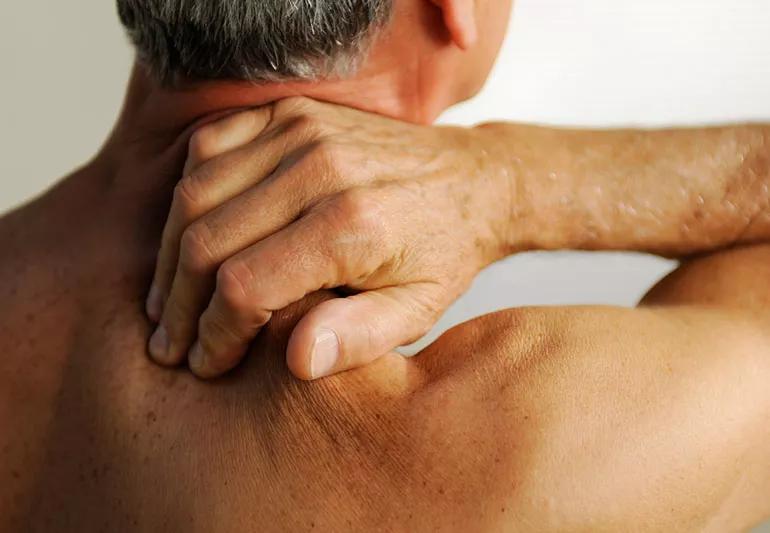Take matters into your own hands

Image content: This image is available to view online.
View image online (https://assets.clevelandclinic.org/transform/632a586b-63fa-4e31-bbd3-eb1311020b9a/pressNeckPain-157434763-770x553_jpg)
Man applying pressure point message to his neck
Your neck muscles are so tight you could strum them like guitar strings. But this song is definitely not music to your ears.
Advertisement
Cleveland Clinic is a non-profit academic medical center. Advertising on our site helps support our mission. We do not endorse non-Cleveland Clinic products or services. Policy
You’re rubbing and pushing and prodding your sore muscles – but is that actually helping? Or could you be making things worse?
With the right simple steps, your tensed-up muscles can start whistling a happier tune. Chiropractor Chad Adams, DC, explains the ins and outs of trigger point massage.
Muscle knots are those kinks in your back and the tight, ropy strands in your neck. Also known as trigger points, they are areas where your muscles have tensed up and refused to let go.
“A trigger point is a muscle spasm — a signal from the brain saying, I’m not sure what to do, so I’m going to freak out and be tight,” says Dr. Adams.
Trigger points form as a result of repetitive activity. That might be something like swinging a tennis racket over and over, or – for many of us – hunching over our desks and pounding the keyboard day in and day out.
“The body can endure a lot of stress, but we weren’t designed to do the same activity over and over, every day,” he says. “Those tight spots are cries for help.”
So how can you get your freaked-out muscles to chill? Pressing on the muscle knots, called a trigger point self-massage, is a great place to start, Dr. Adams says. The simple pressure can help muscles relax.
Advertisement
Here’s how to self-massage:
How hard should you push? It varies. Some people can handle intense pressure; others are a bit more … delicate (no shame). Go ahead and dig in — it’s unlikely you’ll push hard enough to do any damage, Dr. Adams says.
Still, it might not feel great in the moment. “Discomfort is part of the process,” he adds. But intense pain is not. If you feel a sharp pinch or tingling, you might have an injury that goes beyond muscle tension. In that case, quit with the thumbs already and get yourself to a doctor.
After each mini-massage, your muscles should feel looser. Over time, regular trigger point massages can help bring longer-lasting relief.
But also think about what you can change in your environment to make your muscles happier. Could a better desk chair help your posture? Can you take breaks to stretch throughout the day?
If you’ve made those changes, but the knots keep returning for an encore, it might be time to call in the pros. Consider seeing an expert such as a chiropractor, physical therapist or massage therapist.
Above all, Dr. Adams advises, pay attention.
“Too often, people ignore the signals from their bodies. Pain is the warning light on the dashboard,” he says. “Your body is telling you it’s time to make a change.”
Advertisement

Sign up for our Health Essentials emails for expert guidance on nutrition, fitness, sleep, skin care and more.
Learn more about our editorial process.
Advertisement
7 tips for choosing the best pillow to ease neck pain
A physical therapist says it boils down to two key things
Bleeding is a risk and warrants taking care, but the reward of this lifesaving medication is great
Severe and debilitating headaches can affect the quality of your child’s life
With repeat injections over time, you may be able to slow the development of new wrinkles
Type 2 diabetes isn’t inevitable with these dietary changes
Applying a hot or cold compress can help with pain
Pump up your iron intake with foods like tuna, tofu and turkey